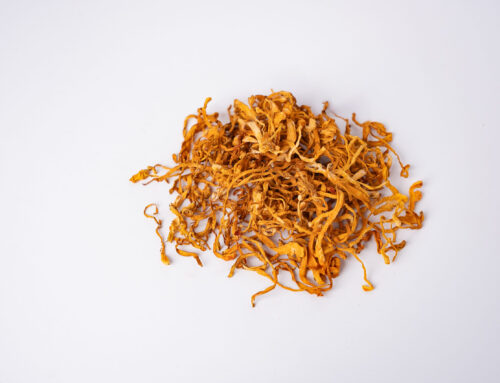When you hear someone talk about inflammation, you might think of pain, swelling and redness in the case of acute inflammation. Chronic inflammation, however, is a different story. That’s what we’ll be exploring here.
Inflammation Comparison
Inflammation is the body’s natural healing response to an injury, an important aspect in the repair process! In acute inflammation, white blood cells bombard the trauma site to kick start the healing process. You might feel the effects of acute inflammation in the case of an allergic reaction or injury that causes trauma to the body.
Chronic (also known as systemic) inflammation involves ongoing stimulation of the body’s normal healing process. For example, white blood cells can speed to areas that are tipped off by simply breathing in environmental toxins or carrying excess fat in one’s midsection.[1] If this process continues, permanent tissue damage can result and bring on the need for other treatments – think Hashimoto’s Disease, where inflammation launches an attack on a perfectly healthy thyroid gland and damages it to the point where medication is needed.
One of the more dangerous forms of chronic inflammation is atherosclerosis. The body perceives a buildup of plaque in the arteries as a foreign invader, then it attempts to create a barrier between the plaque and blood flowing through them. If the barrier breaks down, the plaque breaks up and mixes with the blood, creating a clot. These clots are what cause heart attacks and most strokes.[2]
Chronic inflammation is also associated with diseases that cause wear and tear on the body like rheumatoid and osteoarthritis, lupus, Crohn’s and inflammatory bowel disease.[3]
As in acute inflammation, the body perceives that a threat is present and white blood cells are sent to start the healing process. But if there is no injury, white blood cells just build up and direct their attack on healthy organs, tissues or cells. We can’t feel the inflammatory response so we have no way of knowing it’s happening until the damage is done. Heart disease is one example of this type of persistent inflammation.[4]
The Role of Cytokines
If you’ve read up on inflammation, you would have surely come across the term cytokines, as they play a very important role in the inflammatory process.
The immune system uses a type of protein, or cytokine, to act as a chemical messenger to regulate the immune response. Cytokines released from immune cells bind to receptors on other cells with messages on what functions to perform[5] – kind of like a general giving an order to his soldiers. Chemokines, interferons, interleukins, lymphokines and tumour necrosis factor are different types of cytokines that step in to fight various inflammatory diseases.[6]
Prevention
While we can’t feel chronic inflammation happening in our body, scientists tell us it’s there in varying degrees in every single person. It can be wreaking havoc on our organs and we don’t even know it. So assuming chronic inflammation is present in all of us, it makes sense to take steps to combat it. Turns out it all comes down to lifestyle.
Foods to Avoid
No surprise experts advise to cut out refined carbohydrates like white flour and sugar. Deep fried foods like French fries are another one to cross off your list. Red meat and processed meats like hot dogs and sausage, high-sugar beverages like juices and sodas and margarine, shortening and lard are also important to avoid. All of these foods accelerate the inflammation process.[7]
Foods that Combat Inflammation
The list of anti-inflammatory foods reads like a typical Mediterranean diet: tomatoes, olive oil, almonds and walnuts, leafy greens, fatty fish like salmon, sardines and tuna and a host of fruits like blueberries, strawberries, oranges and cherries (organic of course!) are all must-adds to your daily diet.[8]
Heal Your Gut
If the walls of your gut, or digestive system, aren’t woven tight enough to prevent bacteria, toxins and undigested food particles from passing through to the bloodstream, inflammation can result. In fact, the gut has the highest concentration of immune cells in the body.[9] Again, diet plays an important role in healing a leaky gut as do prebiotic and probiotic supplements.[10]
Reduce Stress, Increase Sleep
We all know stress can make us ill, but eliminating the things that put us on edge is important when it comes to minimizing chronic inflammation. Yoga, meditation or taking long walks can help diffuse a heavy stress load. Studies show that sleep deprivation prompts an increase in inflammatory hormone production, so get your Zs! [11]
The Role of Antioxidants
Free radicals play a part in promoting chronic inflammation that results in damaged tissues. They come from pesticides, fried and burnt foods, microwave cooked foods, trans-fats, hydrogenated oils and countless chemicals and preservatives that are inhaled or absorbed through our skin. Antioxidants can neutralize free radicals before they can harm healthy tissue.[12]
A good-quality, well-rounded immune supplement can help protect against chronic inflammation. CanPrev’s Immuno Multi is an advanced daily multivitamin and multi antioxidant that is specially formulated to neutralize free radicals and combat chronic inflammation. Immuno Multi in conjunction with a healthy diet, moderate exercise, stress reduction and adequate sleep is a comprehensive approach to chronic inflammation busting.
For when chronic inflammation hits your body which could land anywhere like the joints, heart, and bowels, it would not be a pleasant experience. Try these preventive measures and tips that lead to a healthier lifestyle.
Referenced Studies & Content
[1] https://www.health.harvard.edu/heart-disease-overview/ask-the-doctor-what-is-inflammation
[2] https://www.health.harvard.edu/heart-disease-overview/ask-the-doctor-what-is-inflammation
[3] https://www.livescience.com/52344-inflammation.html
[4] https://www.livescience.com/52344-inflammation.html
[5] https://study.com/academy/lesson/what-are-cytokines-definition-types-function.html
[6] https://study.com/academy/lesson/what-are-cytokines-definition-types-function.html
[7] https://www.health.harvard.edu/staying-healthy/foods-that-fight-inflammation
[8] https://www.health.harvard.edu/staying-healthy/foods-that-fight-inflammation
[9] https://www.mindbodygreen.com/0-25499/15-simple-ways-to-create-an-antiinflammatory-lifestyle.html
[10] https://www.healthline.com/nutrition/improve-gut-bacteria#section5
[11] https://www.news-medical.net/news/20101115/Acute-sleep-deprivation-increases-inflammation-Research.aspx
[12] https://naturallysavvy.com/care/reversing-chronic-inflammation-naturally







Thanks CanPrev! I love you JointPro product – great for reducing inflammation. I just wrote a blog on inflammation if people are curious about foods that help